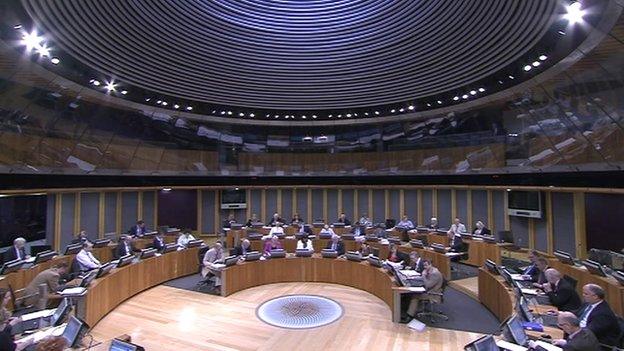Cross-party deal on more AMs possible, says academic
- Published
Professor Roger Scully says more AMs will be a 'more difficult sell' for the public.
Agreement between assembly parties to boost the number of AMs is "possible", a leading academic has said.
Presiding Officer Elin Jones has called the 60-member Senedd "over-stretched".
A new report by Prof Roger Scully suggests 87 AMs - three for each of the 29 new, larger constituencies being proposed - to handle the increasing workload.
Rachel Banner, who campaigned against more assembly powers in 2011, said parties had denied wanting more AMs.
Wednesday's report by the Wales Governance Centre and Electoral Reform Society puts forward options the authors think could gain support from across the parties, particularly as the biggest party - Labour - is not significantly adversely affected.
Rachel Banner says the public must be given a vote on any increase in AMs
Powers over elections are set to be devolved in the Wales Bill, currently passing through Parliament, but to change the system, two-thirds of AMs would need to agree.
Prof Scully, of the Wales Governance Centre, said he thought cross-party agreement was "possible".
He said it seemed "do-able" to get Labour, Plaid Cymru and the Conservatives "on board", with the agreement of UKIP - which has been sceptical about increasing the number of AMs - "more possible after the discussions that we had with them".
The report said there would need to be changes to the electoral system if the number of AMs was to be increased.

What systems does the report propose?

Currently voters fill in two different ballots for assembly elections
Currently there are 40 constituency AMs elected through first-past-the-post, and 20 regional AMs elected through the proportional additional member system.
With Parliament set to cut the number of Welsh MPs to 29 in new, larger constituencies, the report suggested these boundaries are also used as the basis for assembly elections with three members per seat - a total of 87.
The report suggested two preferred options:
Single Transferable Vote - where voters select candidates in order of preference
Open List - where voters can back a party's proposed list of candidates, or vote for an individual
The analysis said a new electoral system should produce results that are at least as proportional as the existing system - where the share of seats a party gets reflects the share of the vote.
"We think they are workable options that might plausibly be able to get consensus," said Prof Scully.
Why have there been calls for more AMs?
The UK government's St David's Day agreement in 2015 found consensus among assembly groups that the institution's size "should be increased so that it can perform its scrutiny role better".
It has been argued there are not enough AMs to scrutinise the work of government and legislation it wants to pass.
Not all parties share that view, however.
The consensus in 2015 was across the assembly's parties then represented in the assembly - Labour, the Welsh Conservatives, Plaid Cymru and the Liberal Democrats.
UKIP did not have AMs at the time.
There has also been opposition from Rachel Banner, who led the referendum campaign against legislative powers for the assembly in 2011.
On BBC Radio Wales' Good Morning Wales programme she said AMs should call another referendum if they want to expand their numbers.
"In 2011 politicians vehemently denied a 'yes' vote would lead to more AMs," she said.
"Politicians need to regain people's trust. They are not going to do that by saying one thing and doing another all the time."
What do the parties say?
Plaid Cymru welcomed the report - a spokeswoman said it had long called for a fairer voting system and for the assembly's capacity to be increased.
A Labour group spokesman said: "It is important that we involve the people of Wales throughout these ongoing discussions."
The Welsh Conservatives also welcomed the study but added "any changes must benefit the people of Wales and bring value for money for the taxpayer".
UKIP however restated its opposition to increasing the number of AMs, saying it was "against a costly increase" and pointed to its manifesto where it said MPs and councillors could help the assembly with its scrutiny work.
However, Prof Scully said: "Even amongst UKIP members there was at least broad acceptance that the assembly is under-powered in terms of its own internal resources."
The Assembly Commission - which has a UKIP member Caroline Jones - had earlier also agreed that the case for a larger assembly was more compelling than ever, and to explore the issue on a cross-party basis.
Presiding Officer Elin Jones welcomed the report, saying it would "aid the discussion".
"Subject to the passing of the Wales Bill, which is currently before Parliament, the power to legislate to increase the size of the institution and to reform the electoral system will be devolved to the Assembly," she said.
"The Commission unanimously agreed that it will take this work forward, acting on behalf of the institution, and in the interests of democracy in Wales."
- Published14 November 2016

- Published22 January 2015
